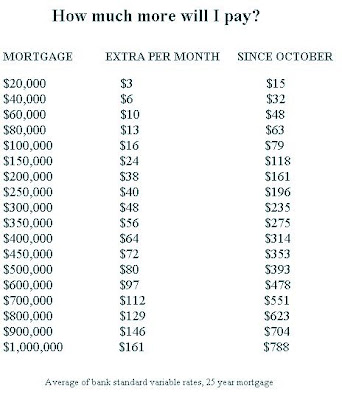Westpac 7.51%
St George 7.43%
ANZ Bank 7.41%
Commonwealth 7.36%
National Australia Bank 7.24%
Economists are warning of still more interest rate pain after the Reserve Bank pushed up rates for the sixth time in eight months, lifting standard variable mortgage rates to near 7.5 per cent.
The new lineup sees Westpac the highest at 7.51 per cent and National Australia Bank the lowest at 7.24 after each of the big four fell in line with the Reserve and lifted rates 0.25 points.
The new rates will add a further $48 to the monthly cost of repaying a $300,000 mortgage and $64 to the cost of repaying a $400,000 mortgage, taking the total extra costs since October to $235 and $275 per month.
Labelling the decision "tough" Treasurer Wayne Swan said it was "unfortunately one of the diffficult consequences of an economy recovering better than other advanced economies".
The Bank said "considerable buoyancy" in the housing market and a bigger than expected mining boom certain to "add to incomes and foster a build-up in investment" would boost Australian economic growth over the year ahead and push inflation toward the upper end of its target band.
So big and earlier than expected was the resurgence in minerals prices... that the Bank expected them to soon surpass the all-time peak reached before the onset of the financial crisis in 2008.
"With the risk of serious economic contraction in Australia having passed some time ago, the board has been adjusting the cash rate towards levels consistent with rates to borrowers close to average," the statement said. "The Board expects that as a result of today’s decision rates for most borrowers will be around average levels."
Macquarie rates strategist Rory Robertson said the Bank was declaring "phase one of momentary tightening over," but he said phase two could start within months.
"I think the Bank will pause at least one meeting, but as early as July it may have marshaled the arguments as to why policy doesn't need be just neutral, it needs to be restrictive. There is a clear and growing bias for rates to go substantially higher."
Kevin Grice, an economist at Capital Economics in London agreeed saying Australia was "likely to be the first of the world's major economies to move beyond neutral".
The political danger for the government is that the Reserve Bank's words will no longer allow it to claim that any future rate rises are part of the process of returning to normal.
Treasurer Swan said his "no frills" budget due next Tuesday would take pressure off the economy by attending to capacity constraints. Economic stimulus was already being withdrawn.
But Opposition Treasury spokesman Joe Hockey called on him to do more, saying he could take pressure off house prices by making available more land.
"Most governments in Australia are Labor governments – they control the supply of land. I would say ring up your mates in the states, end the blame game and get more supply of land."
In an attempt to boost housing supply in Victoria Treasurer John Lenders yesterday introduced a new $20,000 grant for first home buyers of newly built home in metropolitans and $26,500 for newly built regional homes.
Mr Swan said the housing market had "long-term" problems "made worse by the impact of the global recession".
"It meant much finance for multi-unit development did not flow. We have been working on this issue since day one, and we have to do more."
Published in today's SMH and Age
Related Posts
. Could our mining boom last another 10 years, another 20?
. To normal and beyond - the RBA's interest rate path
. The RBA thinks we're in for a wild ride. It wants rates up first
